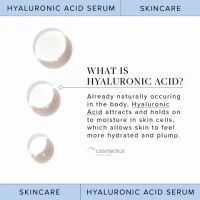Health
Benefits of hyaluronic acid for acne

Discover the benefits of hyaluronic acid for acne.
In most acne scars there is a loss of skin volume ( atrophy ), which gives the area where they form a depressed or “engraved” appearance.
This atrophy is the product of a lack of hyaluronic acid and collagen in the dermis, the intermediate part of the skin, responsible for giving the turgidity, volume, and elasticity of healthy skin.
Methods of treatment
There are different methods to treat atrophic scars, which we could classify into two different groups according to their speed of action:
· Immediate effect. They are called fillers, biocompatible substances that can be injected into the skin to give volume to areas that have lost it.
Among them, those of hyaluronic acid, polylactic acid, or calcium hydroxyapatite stand out among others. Its turgid effect is immediate, filling cavities, furrows, and atrophic areas of the skin with very natural results. The duration of these materials is limited, so periodically (every 6 – 18 months ) it is common to practice a new session.
· Delayed effect. It implies that they promote the synthesis of collagen and ground substance of the dermis. It is worth mentioning the fractional lasers (ablative or non-ablative) and the intermediate and deep peels.
The main advantage of these methods is that their effect is permanent once the optimal point of improvement has been reached, which is not immediate but after practicing several sessions of the procedure.
Hyaluronic acid is indicated in the treatment of atrophic, depressed, and ice-pick acne scars. There are different densities of hyaluronic acid, designed to treat different forms of atrophy or loss of volume.
For the treatment of moderate or ice pick acne scars, it is useful to use low and intermediate densities; and to recover a large volume in especially atrophic areas, it is possible to use higher densities to cover the maximum repertoire of defects.
The main advantages of using hyaluronic acid lie in its immediate action, its durability, its biocompatibility, and its minimal allergenic potential. This molecule can fill in atrophic scars, providing optimal volume immediately and in the short term, promoting collagen synthesis in the long run.
In this way, the irregularity on the surface of the skin is substantially reduced after the application of hyaluronic acid, improving the overall appearance of the skin in the treated area.
Another positive aspect of using hyaluronic acid is that it usually only requires a single application session. Likewise, fillers are one of the best tolerated aesthetic procedures since they have a minimal rate of adverse effects and the pain caused is minimal if a precise technique is followed. Slight erythema (redness) that lasts 2-4 hours after the procedure is common and can be reduced with the application of cold compresses.
According to studies published by Halachmi et al, the satisfaction rate and results in patients with atrophic acne scars and ice pick treated with hyaluronic acid are excellent.
The only limiting aspect of hyaluronic acid fillers is their duration. This molecule is naturally degraded in the skin, its effect persisting for 6-18 months depending on the density of hyaluronic acid used and the indication for which it has been applied.
Specifically, for acne scars, the duration of hyaluronic acid is the maximum possible, since it is retained within the fibrosis that partitions the scars. It should be remembered that, in the long term, this molecule favors the synthesis of collagen, so that the perceptible effect is progressively more durable as different sessions are carried out.
FREQUENT QUESTIONS
What is the main indication of hyaluronic acid in acne scars?
Its main effect is to fill in depressed scars and regularize the appearance of the skin surface.
When is the effect of hyaluronic acid noticeable?
The effect of hyaluronic acid is immediate and noticeable at the end of its application. Over a week or so, the hyaluronic acid settles in the applied area and the surface where it has been applied progressively becomes even more regular.
How is hyaluronic acid applied?
The procedure is performed in the Dermatology consultation through microinjections applied under the scars to be treated. An anesthetic cream is usually used before the session and it is very tolerable, with minimal discomfort.
How many hyaluronic acid sessions are needed to treat facial acne scars?
In general, if they are not very deep or extensive, one is enough.
How is the face after doing the filling session?
The corrective effect of hyaluronic acid is immediate. At the end of the session, most atrophic and depressed scars have recovered all or part of their lost volume. Immediately after the session, it is usual to see some redness in the treated areas and slight swelling, which usually lasts between 2-4 hours.
It is possible, although infrequent, that during the procedure a minimal punctual hematoma may appear in an injection area, which will disappear spontaneously over a week or so.
Is it a painful procedure?
Filling with hyaluronic acid after application of anesthetic cream is one of the most well-tolerated and appreciated aesthetic procedures, with an excellent satisfaction rate for the patient.
Can fillers be combined with other acne scar treatments?
Yes. They can be used concomitantly with ablative/non-ablative peels or lasers, or even botulinum toxin if desired. It is recommended, yes, to carry them out in different sessions.
Is the effect of hyaluronic acid definitive?
No. Although with each session there is a certain accumulation of the effect due to the collagen synthesis promoted by hyaluronic acid, it is advisable to perform a filler every 6-18 months depending on the indication and the area to be treated.
Health
Benefits of almond milk for weight loss

Discover the benefits of almond milk for weight loss.
We can take advantage of the contribution of healthy fats, amino acids, and fiber from almond milk to lose weight and take care of our general health, since it also has cardiovascular and bone benefits.
Many people have started consuming almond milk to lose weight. Although it is a drink with a high caloric intake compared to other non-dairy milk, its contributions of fiber, amino acids, and healthy fats make it a great option for the diet.
On the other hand, it is a food free of lactose and gluten, and its cholesterol concentration is almost zero. In addition, it is an interesting contribution of calcium, which makes it also suitable for caring for bones. What other benefits does it provide? How do you prepare?
Due to the boom, it has had among Hollywood celebrities, it can now be purchased in commercial presentations. However, its natural preparation is still recommended, since it is the best way to preserve all its properties and avoid chemical additives.
Benefits of almond milk for weight loss
Almond milk has become popular throughout the world as one of the best substitutes for cow’s milk, according to this study from the San Paolo Hospital in Milan, although it is advisable to administer it together with other compounds in the case of babies. It is not only recommended for those who are lactose intolerant and followers of the vegan diet, but also for those who want to take care of their weight and health.
From a nutritional point of view, it stands out for its contribution of omega 3 fatty acids, a type of healthy fat that protects the health of the heart. This nutrient lowers the concentration of cholesterol in the arteries and contributes to proper metabolic function. This is suggested by this research from the University of Chile.
It also makes a light contribution of complex carbohydrates, a macronutrient that helps to have an optimal level of energy. Its slow assimilation keeps the metabolism active and prevents high spikes in blood glucose.
Due to its calcium and magnesium content, its regular consumption also strengthens the bones. Although its contributions are not as high as those of cow’s milk, they are significant to obtaining the body’s requirements.
Another important reason to drink almond milk for weight loss is its amino acid content. As some know, these nutrients are key to losing weight and increasing muscle mass. Its adequate assimilation improves sports performance and reduces the risk of injuries.
How to prepare almond milk to lose weight?
The preparation of almond milk to lose weight does not take too much time and is quite simple. In addition, it is healthier than buying milk that is sold on the market, as it does not contain preservatives or chemical additives.
Ingredients
•1 cup of natural almonds, not roasted (150 g)
•6 cups of water (1.5 liters)
Preparation
•First, soak the almonds in two cups of water (500 ml).
•Let them sit for at least 8 hours, or overnight.
•After this time, discard the soaking water and put the almonds in the blender.
•Add the remaining cups of water and process for a few minutes.
•After obtaining a white and foamy drink, proceed to strain it.
•Use a cloth strainer for best results. Squeeze the milk well and store it in a glass jar with a lid.
Note: Optionally you can add a little cinnamon and honey.
Consumption mode
Have a cup of almond milk at breakfast or during snacks.
If you prefer, use it as a base to prepare your smoothies with fruits and vegetables.
Try to moderate its consumption, since in excess it can add many calories.
How to use leftover almonds?
After straining the almond milk you will be left with fine flour that can be reused. It’s a great option for another healthy diet recipe. However, to store it, you will have to do another process.
Instructions
•Preheat the oven to 350ºF (about 180ºC).
•Meanwhile, spread the almond flour on a tray.
•Put it in the oven and leave it for 15 minutes, until it is very dry.
•Use this flour to replace refined flour when making cookies, bread, or any dessert.
•Did you know? 6 consequences you can suffer from eating refined flour
Contraindications of almond milk
Although almond milk for weight loss provides many benefits, its contraindications should not be overlooked. In case of metabolic disorders, pregnancy, or specific diseases, it is better to consult a doctor before consumption.
•Drinking almond milk in excess can hinder the absorption of iodine.
•It contains substances that can irritate the thyroid gland, causing inflammation.
•It is not recommended for babies.
•Ingested in large quantities, it can trigger migraine attacks due to its tyrosine content.
In summary, preparing almond milk to lose weight has important benefits. However, some special cases must be considered so that its intake is not counterproductive.
Health
20 benefits of Mucuna Pruriens and side effects

Table of Contents
Discover the 20 health benefits of Mucuna Pruriens and side effects.
Mucuna Pruriens , known as velvet bean, is a plant of the legume family.
The original habitat of Mucuna Pruriens extends throughout the tropics on all continents, beginning with Africa, the Caribbean islands, northern Australia, India, Southeast Asia (including Indonesia), and the Pacific islands.
Mucuna Pruriens is a seasonal legume that grows to spread.
This plant can be used for human and animal food (forage and seeds) and environmental services.
The young leaves, pods, and seeds can give some benefits, especially for food ingredients like Tempe which originally comes from Indonesia and is made by fermenting boiled seed paste.
Nutrition facts of Mucuna Pruriens
The nutrients contained in Mucuna pruriens are:
• Energy 32 Kcal
• Protein 24 g
• Fat 3 g
• Carbohydrates 55 g
• Calcium 130 mg
• Phosphorous 200 mg
• Zinc 2 mg
• Vitamin A 70 IU
• Vitamin B1 0.3 g
• Vitamin C 0 mg
20 health benefits of Mucuna pruriens
Of the nutrients above, here are the health benefits of mucuna pruriens:
1.- Benefits of Mucuna Pruriens for cholesterol
According to various scientific studies carried out, the results show that mucuna pruriens has saponin content.
This saponin serves to lower cholesterol levels in the body.
This content binds to bile acids and causes bound cholesterol. So this plant is often called an anti-cholesterol plant.
2.- It works as an antioxidant body
Too much oxidation with the skin can cause free radicals.
Therefore, it is necessary to get as many antioxidants as possible that are useful to prevent the appearance of free radicals.
Mucuna pruriens is also one of the plants that contain flavonoids that produce antioxidants or antioxidants.
3.- Prevents skin aging
The flavonoid content in Mucuna Pruriens is also helpful in preventing premature aging.
Self-aging can occur because the skin is often exposed to air pollution and direct sunlight.
The flavonoid will lift the dull skin and regenerate the dead skin from these problems.
In addition, the flavonoid also protects and maintains the health of the skin.
4.- Avoid allergies
According to the study, after consuming or using Mucuna Pruriens, the body will respond to things that can cause the allergy to be rejected.
So that the body becomes comfortable with the disturbance that surrounds it.
The smell and taste of this plant are also not too strong which can often cause allergies.
5.-Benefits of Mucuna Pruriens for diarrhea
Eating foods and drinks that contain flavonoids like mucuna pruriens is also beneficial for the digestive system.
The benefit is preventing the body from lacking fluids that can cause diarrhea.
This disease is often infected, especially in children.
6.- Increased libido (aphrodisiac)
Inside mucuna pruriens, there is a substance called levodopa and it gives some good effects as an aphrodisiac.
It can increase libido, which can be interpreted as an increase in a person’s sexual desire.
This can happen to both men and women.
According to some studies, especially in Brazil, people use the leaves of this plant to increase male sexual desire and it shows some great results.
7.- Protein producer and energy source
The mucuna pruriens that we already know from above can be used as one of the raw materials of Tempe.
It is also beneficial as a source of protein substitutes apart from the more expensive meats and contains other substances.
Mucuna pruriens serve as an essential nutrient in the body.
This plant contains epinephrine (adrenaline) and norepinephrine that give some effects that can increase energy and focus. It is the same result as a dose of caffeine.
Therefore, consuming it will increase the body’s energy inactivity.
Also, the body will feel full for a long time, and it will make the body feel more energetic.
8.- Heals minor wounds
The sap from the stem of the mucuna pruriens plant is beneficial in treating minor external ulcers.
It is because the content in the stem can heal these minor wounds, such as torn, stabbed, cut, scratched, or lightly burned wounds.
9.- Relieves Parkinson’s disease
Parkinson’s disease is a gradual degeneration of nerve cells in the center of the brain that regulate body movement.
Parkinson’s itself can also lead to other serious illnesses, especially psychiatric problems.
L-dopa contained in the seed of mucuna pruriens is a precursor of dopamine and improves the level of dopamine in the brain.
However, L-dopa is not the only substance responsible for use in the prevention of Parkinson’s disease.
In addition, there are other substances in the seeds that can act as neuroprotectors and reduce the symptoms of Parkinson’s disease.
10.- Helps reduce stress
Feelings of stress can be fatal to the body. This is because if a person is depressed, they will tend to perform actions that are beyond the control of their mind.
Also, it can affect others because that person will try to blame others, get angry easily, and most dangerously, that person can also hurt others to get rid of stress.
Fortunately, the consumption of mucuna pruriens can refresh the mind to be calmer due to the fragrant smell and taste.
11.- Benefits of Mucuna Pruriens for diabetes
Mucuna pruriens contains proteins and some vitamins that are useful in the fight against hypertension.
The study was carried out in mice and concluded that blood sugar levels were lowered by 21.89% in four weeks.
The result of this can also be used by humans. We already know that proteins can maintain blood sugar levels and that vitamins contain antioxidants and pure sugar that do not increase blood sugar levels.
12.- Increases the immune system
Within the mucuna pruriens, there are phosphorus and calcium substances that increase resistance and white blood cells.
According to 1996 research at the University of Arkansas, phosphorus deficiency is often associated with vitamin D and calcium deficiency.
These nutritional deficiencies can enhance the autoimmune disorder.
13.- Helps maintain the nervous system
The content of vitamin B1, phosphorus, and iron in Mucuna pruriens is very important to keep the nervous system working properly.
Phosphorus is one of the important minerals in the body. Phosphorus directly maintains normal neural activity.
While iron plays a role in red blood cell regulation, it remains awake, so the nerve can work optimally.
14.- It can substitute Viagra for the reproductive system
Popular research claims that couples who have healthy and active sex lives are relatively happier and even live longer.
But this can be problematic if the man has erectile dysfunction.
Viagra is the most popular pill for increasing sexual desire/libido in men and it also helps with erectile dysfunction.
People of all ages use these blue pills which hurt health.
Therefore, the consumption of mucuna pruriens becomes a more natural substitute for viagra.
In addition, it is good for normal fertility, healthy sperm and eggs, proper functioning of the reproductive organs, and proper genital secretions.
Here are more health benefits of Mucuna Pruriens.
15.- Good for diet and losing weight
16.- Protect the heart
17.- Circulate the blood flow
18.- Fight against cancer
19.- Good for pregnant women
20.- Make the digestion system work smoothly
Side effects of mucuna pruriens
Contains hydrocyanic acid
Mucuna pruriens contains acid cyanide poison (HCN), especially in the seeds.
This is what reduces the interest in consuming this plant.
One way to eliminate it is by soaking the beans in the water for 1 day, with every 6 hours to replace the water.
This experiment has been done many times and the result is very good but it is too complicated for people who always want an instant path.
It can cause vomiting, headaches, and poor sleep
We should not consume too much mucuna pruriens because it can cause some problems such as vomiting, headaches, and insomnia.
These are all the health benefits of mucuna pruriens.
However, there are some side effects if we eat or use too much. Stay healthy and good luck.
Health
11 Benefits of pepper and side effects

Discover the 11 shocking health benefits of pepper and side effects.
The bell pepper (Capsicum) an ancestral spice, is a diverse and spicy edible fruit of any of the varieties within the Capsicum genus.
With the well-known popular use of the pepper, multiculturally, and for generations around the world, interest is developing in knowing the medicinal benefits of this natural plant food and culinary spices.
Many people are familiar with the use of bell peppers in the preparation of spicy foods, but what is it that makes them spicy?
The answer is capsaicin, an odorless and tasteless phytochemical that produces the heat in bell peppers.
With the varieties of peppers available, it is important to know that the capsaicin content of each type varies and that it is possible to get less heat and still receive the health benefits of the active ingredient capsaicin from chili peppers.
Capsaicin is found in the fleshy membrane of sweet and hot peppers and a higher concentration in the seeds.
This natural fruit can be used fresh or dried as a culinary spice, added to teas, or taken in capsules to reap its medicinal benefits.
The health benefits of pepper include relief from stomach problems, back pain, muscle spasms, headaches, cancer, aging skin, peptic ulcers, menopausal problems, lower risk of cardiovascular disease and diabetes.
It has anti-inflammatory and analgesic properties, and it can also provide relief from arthritis-related pain. Capsicum also helps with fibromyalgia and psoriasis
Nutrition facts of Capsicum
• The use of whole chili peppers of the genus Capsicum provides nutritional value, including high amounts of vitamin C and vitamin A.
• These vitamins are best obtained from fresh fruit.
• Chili peppers harvested when the color is red rather than orange or yellow have higher concentrations of these beneficial nutrients.
• Other beneficial bioactive components of bell pepper are the flavonoid content.
• Alkaloids and tannins are some of the other important bioactive compounds contained in it.
• Alkaloids work as anti-inflammatory, pain relievers, and antioxidant agents.
11 Health Benefits of Pepper
Adding capsicum to your daily diet can provide great health benefits against many ailments. Let’s see the benefits in detail:
1.- Benefits of pepper for inflammation
• The phytochemical constituents of bell pepper have been shown to produce an anti-inflammatory response that alleviates peripheral neurogenic pain related to Crohn’s disease, an inflammatory disease of the intestines.
• Another example of peripheral neurogenic inflammation in cutaneous pain of the skin.
• Pepper creams and balms are often applied by massaging topically onto the skincare to avoid open areas and mucous membranes.
• The burning effect of capsicum is felt when applied to the skin, which is caused by an inflammatory response from the peripheral nerve endings.
• But regular application attenuates sensory nerve endings and relieves chronic diabetic neurogenic pain.
• Some suggest that the anti-inflammatory effect of bell pepper may also help ease arthritis-related pain.
• Its cream can be used as an option to treat this disease and many others.
2.- Benefits of pepper for stomach
• Capsicum contains tannins. Tannins are astringent and are often considered beneficial when treating gastrointestinal disorders such as diarrhea, dysentery, and other microbial disorders.
• Gastric mucilage works to protect the gastric lining and prevent the development of peptic ulcers.
• Studies suggest that it acts as a mucilage to increase gastric mucus production and help treat peptic ulcer disease.
• Taking capsicum can increase nasal drainage due to the presence of phytochemical capsaicin.
• Also, for this reason, it is beneficial to avoid touching your eyes or body mucus membranes when preparing capsicum peppers.
• In the same way, wash your hands thoroughly after preparation to avoid transferring volatile oils containing pepper to these sensitive areas.
3.- Benefits of pepper for cancer
• Another bioactive effect of the tannin contained in the pepper is in the prevention and treatment of cancer.
• Studies have shown that it has an inhibitory effect on many types of malignant cancers.
• These antitumor properties are most beneficial in treating lung, liver, and gastric cancers.
• The antioxidant effects of capsicum show a possibility of treatment for other types of cancer, such as hormone-related prostate cancer.
• The anti-cancer effect of pepper is determined by the bioactive ability of the phytochemical capsaicin to inhibit the growth of cancer cells.
• Capsaicin also destroys already damaged cell structures in the human body.
4.- Benefits of pepper for heart
• Studies on flavonoids have suggested that they are beneficial in preventing coronary heart disease.
• The pepper is both caloric and vasodilator.
• A suggested effect of the vasodilator properties of the pepper is the improvement of hypotension and the decrease of the heart rate.
• Vasodilation allows better blood flow resulting in better oxygenation of organ tissues.
• This is most likely due to tachykinins, a known bioactive ingredient in capsicum.
5.- Antioxidant agent
• Many of the bioactive compounds in bell pepper provide antioxidant effects.
• Enhanced vasodilation allows these antioxidant phytochemicals to circulate throughout the body.
• This allows you to protect and repair tissue and DNA damage.
6.- Benefits of pepper for diabetes
• With the worldwide prevalence of diabetes, the consideration of capsicum as a hypoglycemic drug has sparked research in this matter.
• Some studies have indicated, although it has not yet been concluded, that it can stimulate insulin production resulting in lower blood glucose.
• This would determine a possibility the pepper is beneficial in preventing the onset of type II diabetes and its possible complications.
• The hypoglycemic benefits of the pepper are more concentrated when it is green.
7.- Increases immunity
• The bell pepper contains vitamin C, which is valued as bioactive immune support phytochemical.
• Helps strengthen the immune system, repair damaged brain tissues, and reduce the risk of oxidative stress, pediatric asthma, and cancer.
• It also improves bone health.
8.- Treat fibromyalgia
• Many clinical trials show the efficacy of capsicum in treating fibromyalgia symptoms when applied topically.
• Those who use capsicum topically reported beneficial effects on improving sleep.
9.- Treat diabetic neuropathy
• One disease that often causes neurogenic pain is diabetes.
• Capsicum has been shown to have a beneficial effect on diabetic neuropathic pain when applied topically.
• It works to cushion the skin’s nerve endings and reduces pain.
10.- Benefits of pepper for Skin
• The vitamins in bell pepper have been shown to have an antioxidant effect on cell tissues, which can improve skin health and prevent aging.
11.- Relieves the symptoms of menopause
• Menopausal symptoms can also be alleviated by consuming fruits that contain flavonoids, such as chili peppers.
Uses of the pepper
• The pepper comes in dry form, as a spice like a chili pepper and paprika. The dried spice is used in many sauces or added to beverages such as tea.
Dried bell pepper can be found in whole dried bell peppers, as a single spice, or in dried spice mixes.
• As a more concentrated medication, bell pepper can be placed in a capsule for oral ingestion as a nutraceutical or applied topically to the skin as an analgesic and anti-inflammatory cream.
• With the availability of chili pepper in many markets, it should be considered that although the dried spice is convenient and effective in terms of its health benefits, eating fresh chili provides more benefits.
• As studies show bell pepper is beneficial as a daily health supplement.
The bell pepper is enjoyed by many as a daily food additive in cooking.
The culinary preparation of bell pepper can provide sufficient protection when consumed daily to have beneficial effects on certain chronic and potentially degenerative health conditions.
• The bioactive components in capsicum work together to improve blood flow, act as a cancer preventative and pain reliever, protect the gastric mucosa, and provide nutrients for a healthy lifestyle.
• Although all peppers contain vitamins and other beneficial bioactive components.
However, the color of the pepper determines the growth stage when it is harvested.
It also determines the concentration of vitamins and other beneficial phytochemicals.
In general, it can be said that, whether consumed dry or fresh, chili pepper is medicinal and beneficial to use in a daily diet as both a natural preventative and a treatment for many chronic conditions.
5 simple pepper recipes
A.- Fusilli with mushrooms and peppers
Ingredients (for 2 people)
• 200 grams of fusilli
• 100 grams of mushrooms
• 10 cherry tomatoes
• 1/2 green pepper and 1/2 red
• 1 clove garlic
• 1 lemon
• 2 tablespoons olive oil
• Parsley
• Thyme
• Salt
• Pepper
Preparation
• Wash the peppers, remove the seeds, and cut them into strips.
• Remove the stem from the mushrooms, clean them, run them under water, dry them with a clean cloth, and cut them into pieces.
• Wash the parsley, dry it with absorbent paper and chop it.
• Wash the tomatoes and cut them in half. Peel and mince the garlic clove.
• Wash the lemon, dry it and get a tablespoon of the zest from its skin into thin strips.
• Boil salted water and cook the pasta until al dente.
• Drain and reserve.
• In a very wide pan, heat 2 teaspoons of oil, sauté the minced garlic in it for 1 minute without letting it turn color.
• Add the mushrooms and cook for 2 more minutes. Add the peppers, the tomatoes and cook everything together for about 5 minutes.
• Season with salt and pepper, sprinkle with the chopped parsley, a little thyme, and mix.
• Add the pasta to the casserole with the grated lemon strips, sauté everything together for 2 minutes, and serve.
B.- Beef skewers with peppers
Ingredients for 4 people)
• 750 grams of beef tenderloin
• 1 red, 1 green, and 1 yellow bell pepper
• 50 milliliters of oil
• 2 tablespoons minced thyme leaves
• Salt
• Black pepper
Preparation
• Cut the meat into 3-centimeter cubes and put it in a salad bowl. Sprinkle the thyme, season, and drizzle with the oil.
• Mix and marinate in the refrigerator for 30 minutes.
• Wash the peppers, remove the peduncle and seeds, and cut into squares.
• Thread the meat on the skewers and alternate it with the pepper; place in a large skillet to grill over high heat for 3 minutes on each side.
• Remove from the fire and serve.
C.- Chicken recipe with red and green peppers
Ingredients for 4 people)
• 500 grams of chicken
• 100 grams of onion
• 2 minced garlic
• 50 milliliters of soy sauce
• Basil
• 100 grams of green peppers and 100 grams of red
• Olive oil
Process
• Cut the chicken into pieces of about 2 centimeters. You can use any part of the chicken from the breast to the thighs.
• In a bowl, place the chicken, the onion cut into fine julienne strips, the minced garlic, the soy sauce, and the basil and leave to marinate. Meanwhile, make the peppers.
• Clean and cut the peppers into strips lengthwise. In a skillet, sauté them over high heat for 30 seconds so that they are crisp. Reserve.
• In the same pan where you sautéed the peppers, cook the chicken with the rest of the marinated ingredients. Once the chicken is cooked add the peppers, mix and serve warm.
D.- Peppers stuffed with cheese and bacon
Ingredients
• 12 small green peppers
• 2 sheets of puff pastry
• 225 grams of cream cheese
• 60 grams of smoked bacon
• 120 grams of cheddar cheese grated
• 2 eggs
Process
• Preheat the oven to 180ºC.
• Meanwhile, in a bowl, mix the cheddar cheese, cream cheese, and smoked bacon into pieces.
• Cut the puff pastry into squares of approximately 8 cm x 8 cm.
• Wash the peppers well, remove the seeds and the tail. Cut them in half. Choose small peppers to fit in the puff pastry (or cut larger pieces of puff pastry).
• Fill the peppers with the cheese mixture and smoked bacon. Wrap them with the puff pastry squares.
• Beat two eggs and bathe the puff pastry packets with this mixture. Cover well with the egg mixture.
• Bake for 20 minutes. Remove and serve hot.
E.- Pepper stuffed with ground meat
• 4 pieces of bell pepper
• 400 grams of ground beef
• 2 carrots
• 200 grams of peas
• 1 large potato
• ¼ onion
• 1 clove garlic
• 1 pinch of salt
• 1 pinch of pepper
• 2 tablespoons of oil
Process
• Chop the carrot and potato into small cubes. Once ready, place them in a saucepan with enough boiling water to cook them. Also, add the peas or peas and cook all together, adding a pinch of salt. Once the vegetables are cooked, remove them from the heat, drain, and reserve.
• In another deep saucepan adds the oil, heat over medium heat, and, once hot, add the chopped onion and garlic to fry. Add a taste of salt.
• Once the onion is transparent, add the ground beef to the saucepan and stir to incorporate it perfectly. Let it cook for approximately 15 minutes, stirring constantly so that it cooks evenly.
• Meanwhile, take the peppers and cut the top with the stem to form a kind of lid. Then devein the chiles and clean them very well inside. Reserve a moment.
• On the other hand, once the ground meat is cooked, add the vegetables and let the ingredients of the filling finish cooking altogether.
• When the ground beef and vegetables are done, stuff the peppers. To do this, take a little of the stew and completely cover the inside of the chili peppers.
• Once filled, place them on a baking sheet greased with a little butter. Put some string cheese on top, or any other type of cheese, add the caps so that they also cook on the side, not on top of the chilies, and bake the peppers stuffed with ground beef for 10 minutes at 170 ° C.
• After this time, the peppers stuffed with ground meat are ready to be enjoyed
-

 Food1 year ago
Food1 year ago10 + Benefits of carrot juice and side effects
-

 Health12 months ago
Health12 months ago50 Super Healthy (And Very Often Cheap) Foods
-

 Health1 year ago
Health1 year ago5 Shocking health benefits of kinkeliba and side effects
-

 Food1 year ago
Food1 year ago8 shocking benefits of leek juice and side effects
-

 Health1 year ago
Health1 year agoBenefits of guava leaves Sensually
-

 Weight Loss1 year ago
Weight Loss1 year agoChaz Bono weight loss secret
-

 Benefits2 months ago
Benefits2 months agoThe Benefits of Joining Gym Lumolog – Improve Your Fitness & Health
-

 Health1 year ago
Health1 year ago13 shocking health benefits of Thai eggplant












